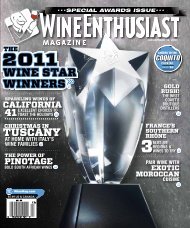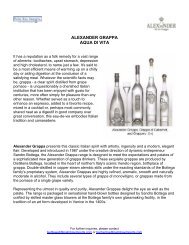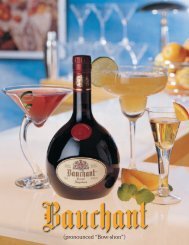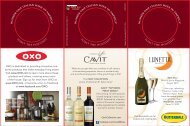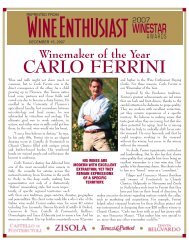You also want an ePaper? Increase the reach of your titles
YUMPU automatically turns print PDFs into web optimized ePapers that Google loves.
marianne rafter<br />
Principato as its house wine. It also approached Taub<br />
about a possible project, hoping to add to the authenticity<br />
of its cuisine and atmosphere. A year later, the restaurant<br />
chain opened the Olive Garden Culinary Institute<br />
in Tuscany, where it sends groups of managers a few<br />
times a year to learn Italian cooking on the ground. The<br />
institute, located in an agriturismo just outside Castellina<br />
in Chianti, is run by one of <strong>Palm</strong> <strong>Bay</strong>’s producers, Rocca<br />
delle Macie. Interiors of the most-recently built Olive<br />
Gardens are modeled on the Castellina farmhouse where<br />
the school is located. Asked how much wine he sells<br />
through Olive Garden, Taub would only smile and say,<br />
“Very significant volume.”<br />
While Cavit provides <strong>Palm</strong> <strong>Bay</strong> with a reliable revenue<br />
stream, the importer has worked to acquire more upscale<br />
wines. Italy still dominates the 75-brand portfolio, but<br />
the company has diversified in the past decade to add<br />
wines from 10 other countries, including France, Spain,<br />
Australia and Chile.<br />
One former <strong>Palm</strong> <strong>Bay</strong> employee who now works for a<br />
rival says <strong>Palm</strong> <strong>Bay</strong> doesn’t usually find undiscovered regions<br />
or wines, but rather identifies the producer with the<br />
most potential in a region and puts sales and marketing<br />
muscle behind them, whether it’s Planeta in Sicily, Feudi<br />
di San Gregorio in Campania, Santa Rita in Chile or Recanati<br />
in Israel.<br />
For many of Taub’s clients, the relationships he builds<br />
are the chief draw. “For a family company like ours, we<br />
share common values and a long-term approach,” says<br />
Jean-Charles Cazes, whose family owns Bordeaux’s Château<br />
Lynch-Bages and eight other wineries in France,<br />
Portugal and Australia. <strong>Palm</strong> <strong>Bay</strong> imports all their wines,<br />
save Lynch-Bages, which is sold through the Place du<br />
Bordeaux. “If I should define David in one word, that<br />
would be ‘charismatic.’ He is a man of vision, and someone<br />
you can trust.”<br />
Filippo Mazzei, who co-manages his family’s Castello di<br />
Fonterutoli in Chianti, says, “<strong>Palm</strong> <strong>Bay</strong> is a dynamic family business,<br />
understanding of Italian culture and values, as well as willing<br />
to establish long-term relationships. David is a very intelligent and<br />
skilled person who usually gets to the point right away with a problem-solving<br />
approach.”<br />
It’s hard to imagine <strong>Palm</strong> <strong>Bay</strong> without Taub’s energy, but it’s not<br />
a one-man show. For six years now, son Marc has worked as COO.<br />
Marc was previously president of the distribution arm, Premier,<br />
but in 2004, the Taubs left the distributing business, selling Premier<br />
to Southern Wine & Spirits for an undisclosed sum. Southern<br />
was making an aggressive play to enter the New York market,<br />
and the wholesaler industry was in a consolidating phase. The<br />
Taubs felt it was time to sell. Both say they believe importing is a<br />
more dynamic, growing industry.<br />
They are also now venturing more into spirit imports. <strong>Palm</strong> <strong>Bay</strong><br />
recently started importing Aperol, an Italian aperitif that is a<br />
lighter, less-bitter version of Campari. In April, they hired Alain<br />
Barbet, former CEO of Pernod Ricard’s Americas division, to head<br />
a new spirits division, suggesting that more brands will soon be<br />
joining the portfolio.<br />
The business is in their blood: <strong>Palm</strong> <strong>Bay</strong> CEO David Taub (left), and his son Marc, COO and president,<br />
have worked for decades in the company founded by David’s father, the late Martin Taub (portrait).<br />
Walking around <strong>Palm</strong> <strong>Bay</strong>’s Long Island headquarters with<br />
Taub can be slow going. He stops almost every young<br />
staffer who passes in the hall to ask him or her a question<br />
or get an update on current projects. He sticks his<br />
head in about half the offices to do the same.<br />
When not working, Taub, with his wife, Linda, a retired<br />
attorney, is actively involved with several charities,<br />
particularly those focusing on cancer treatment. The couple has<br />
three sons and six grandchildren. Marc lives in Manhattan, while<br />
Andrew, the oldest, owns a recording studio in Brooklyn. Youngest<br />
son Joshua lives in the Los Angeles area, where he works as vice<br />
president of sales at Activision, the video game company behind<br />
“Guitar Hero.”<br />
Though he’s handed more responsibilities to Marc at this point,<br />
Taub is active in multiple projects, still feverishly working on fresh<br />
ideas. His eyes start dancing when he talks about a new wine from<br />
Puglia or a new trend in spirits. Taub is doing what he loves—discovering<br />
wines (and the people behind them) and trying to sell<br />
them. He still lights up a room. And he still casts a big shadow in<br />
his industry.<br />
Aug. 31, 2010 • Wine Spectator 79



